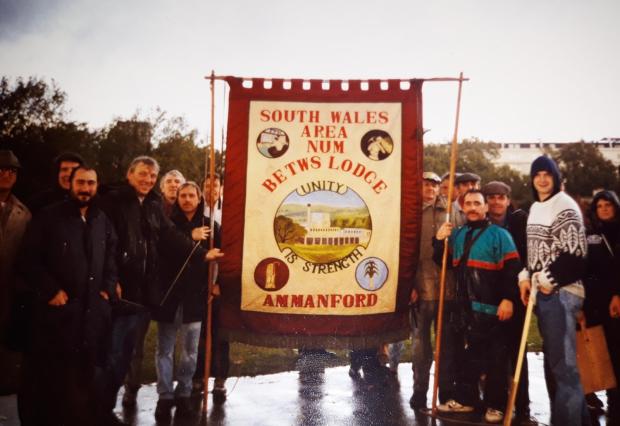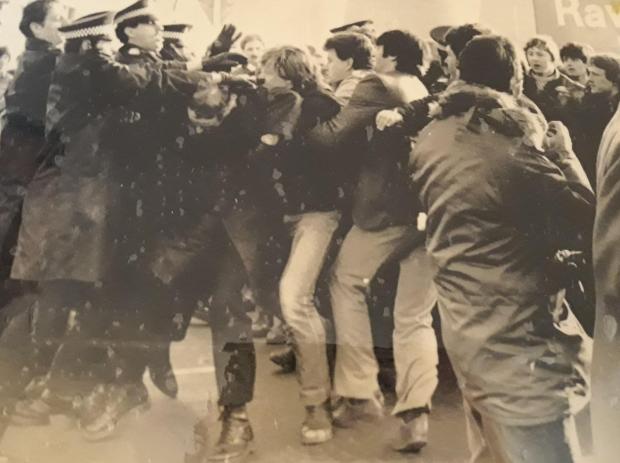UK: End of Miners' Strike Remembered 35 Years On

By Clare Snowdon
March 5, 2020 - This week marks 35 years since the end of the miners' strike.
Described as the “most bitter industrial dispute” in British history and led by Arthur Scargill and the National Union of Mineworkers, the strike by the men who had spent most of their lives working down the pits at collieries across Britain began in 1984 and ended on March 3, 1985.

It followed years of increased tensions between unions and mineworkers and the government after the election of Margaret Thatcher as Prime Minister in 1979.
The newly elected government became heavily involved the mines in the 1980s, before announcing on March 6, 1984 its intention to close 20 coal mines immediately, with a longer term goal of closing another 70 pits.
In response, the NUM and its members launched a series of walkouts and strikes began in earnest.
Although it is now 35 years on, the mining community in the Amman Valley is still scarred by events that led to the eventual pit closures.
At the start of the strike, former Lodge Secretary at Betws Mine, Mike Reynolds was 35 years old, on the verge of a divorce with three children. When leaving school he lived in Australia for two years before returning home and training at Merthyr Colliery, he was then transferred to Betws where he remained until its eventual closure in 1993.
Speaking to the Guardian Mike recalls the year that was to change his life forever.
"It was Sunday, March 11, 1984 and Betws mine workers gathered in the Welfare hall in Ammanford to discuss and vote on whether to support the call for a national strike against the Tory Government plans for pit closures. At that time Betws Anthracite mine was the 'Jewel in the Crown' – certainly in the Welsh coalfield – it was breaking output records on a regular basis.
"The pit was profitable and the workforce enjoyed good wages and at the same time Cynheidre and Abernant miners were working in difficult geological conditions and were making losses and therefore both were on the hit list for closure.
"It has to be remembered that it was under these circumstances that miners working in Betws had to make a decision.
"The atmosphere in the hall was electric, 449 miners having their say, some wanted a secret ballot others stating that all South Wales pits should vote on the same day (only a few lodges had arranged meetings for that Sunday) the rest were voting the day after. From the platform came the reply that we at Betws Mine were the lucky ones we were not on the list for closure and therefore should support Cynheidre in the Gwendraeth valley and Abernant in the Amman valley.
"I'll never forget Glan Roberts getting on to his feet in the middle of the audience and thanking the chairman for explaining the picture so clearly and continued with the words: 'Do we stand and fight or do we take our 30 pieces of silver, Hosanah to the son of David, you are the leaders and I will not crucify you.' Enough said that Glan is now a preacher.
"The time came to make the decision, 271 for the strike and 178 against.
"This was the start of a battle that would continue for a whole year. Miners knew that this was not just a battle for the pits and the communities around them but for labor unions in general. For Thatcherism to be successful they had to defeat the National Union of Mineworkers who were the vanguard of the working class. For those that were active during the strike, picketing, organizing, collecting money etc. it was a year that will never be forgotten.

"For me personally it was a year that changed my life. Sent to Brixton Lambeth South London to head up a team of volunteers and miners from West Wales on a rota basis to galvanize support for the cause. The support we had from the people of Brixton was humbling, one of the poorest boroughs of London but with the biggest hearts.
"Miners collecting money on the Underground whilst dodging the police, selling t-shirts, jumpers with Coal not Dole emblems, lamps, badges on a stall on Brixton market. We had concerts with groups such as Aztec Camera, Everything but The Girl, Orange Juice, The Communards.
"Can you believe that local authority workers in the borough of Lambeth agreed to have money deducted from their pay every week towards the miners' fund.
"I had the honor of being on the same platform as Tony Benn and Dennis Skinner. I will never forget two miners' wives from the Amman valley who had thought that they were in Brixton to collect money but were ushered up on to the platform in front of over a thousand people. They were shivering with fright and turned to me and said 'does dim rhaid i ni ddweud dim byd?' (we don’t have to speak do we?)
"They did speak and had a standing ovation and brought tears to the eyes of many in the audience. It's true to say that without the support of the mothers, wives and family the strike would not have lasted so long.
"In March 1985 it was decided to go back to work without a definite contract due to the fact that so many were crossing the picket lines in other areas although South Wales continued to remain steadfast. Arthur Scargill was stating a fact when he said that Thatcher and the conservative government wanted to decimate the coal industry and smash the trade union movement. This led to the great sell-off of national industries and deregulation of the financial services and the rundown of manufacturing with the mantra that we would be better off with private multi-national companies taking over.
"Tell that to the pensioners and the low paid who have to pay high prices for gas, electric and water. Sky high fuel prices, travelling by train is becoming too expensive but it is still heavily subsidized even though it’s not owned by us anymore.
"There seems to be no shame with leaders of industry and the banking sector, who pay themselves ridiculously high wages and give themselves bonuses for failure. Where are the men of principle in politics? We are ruled by an elite and a political class that are more concerned with helping themselves and their compatriots to make even more money.
"Was the year long strike worth it you may ask, I and many others that took that decision would stand up again today and vote to support our communities and fellow workers.
"This is not the politics of envy as they would like you to think but of fair play."

